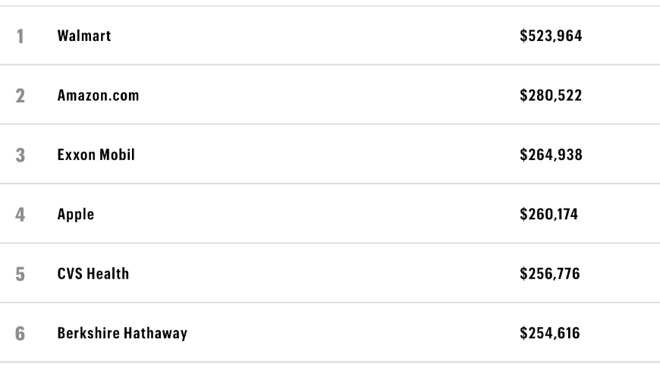Apple fourth on 2020 Fortune 500 list, passed by Amazon
The 66th Fortune 500 list was released on Monday morning detailing the largest corporations in the United States, with Apple slipping a bit to the number four spot.

Apple is on the Fortune 500 for the 38th time
Apple was ranked third in 2019, with Amazon pushing them down one by moving into the number two position. Apple saw $260 billion in revenue, behind Exxon with $264 billion and Amazon with $280 billion. Walmart continues to be the number one company for the eighth year in a row with $523 billion in revenue.
Apple's revenue fell 2% with $55 billion in profits, a 7% drop in profits year-over-year. Apple is still the most profitable tech company, beating out Microsoft's $39 billion in profit. However, Fortune notes that the market holds Microsoft as the most valuable company by stock, at a $1.38 trillion market cap. Apple is not far behind at $1.33 trillion, with Amazon in third at a $1.2 trillion market cap.

Amazon pushed Apple to the number four spot
Fortune goes on to detail Apple's finances, stating that iPhone sales fell 14%, which is 55% of Apple's total revenue. Apple services grew 16%, and makes up 18% of the total revenue. Wearables grew 41%, while only making up 9% of the total.
The numbers are all based on revenue generated in the fiscal year 2019. Apple has appeared on the Fortune 500 list for 38 years. This entirety of the Fortune 500 ranking represents two-thirds of the U.S. economy with $14.2 trillion in revenue.

Apple is on the Fortune 500 for the 38th time
Apple was ranked third in 2019, with Amazon pushing them down one by moving into the number two position. Apple saw $260 billion in revenue, behind Exxon with $264 billion and Amazon with $280 billion. Walmart continues to be the number one company for the eighth year in a row with $523 billion in revenue.
Apple's revenue fell 2% with $55 billion in profits, a 7% drop in profits year-over-year. Apple is still the most profitable tech company, beating out Microsoft's $39 billion in profit. However, Fortune notes that the market holds Microsoft as the most valuable company by stock, at a $1.38 trillion market cap. Apple is not far behind at $1.33 trillion, with Amazon in third at a $1.2 trillion market cap.

Amazon pushed Apple to the number four spot
Fortune goes on to detail Apple's finances, stating that iPhone sales fell 14%, which is 55% of Apple's total revenue. Apple services grew 16%, and makes up 18% of the total revenue. Wearables grew 41%, while only making up 9% of the total.
The numbers are all based on revenue generated in the fiscal year 2019. Apple has appeared on the Fortune 500 list for 38 years. This entirety of the Fortune 500 ranking represents two-thirds of the U.S. economy with $14.2 trillion in revenue.

Comments
The weirdest part of counting revenue is that if someone buys a MacBook from Amazon (or Walmart), it counts as $1000 in revenue for Amazon (or Walmart) and $800 for Apple (or whatever the wholesale price Apple charges Amazon for a MacBook). Seems biased in favor of retailers.
The longer answer is revenue has traditionally been seen as the measuring stick of a growing company. It's also traditionally been the less objectionable public facing number. Revenue is also a bigger number so in the vein of "bigger is better" attention grabbing headlines, it's a more attractive stat to get the reader's attention.
Profit numbers have primarily not been mentioned in polite company. In certain circles, big fat profit was associated with greed, especially when it was the measuring stick almost exclusively associated with financial services/banking, big oll, and big pharma - 3 industries with less than stellar PR. The tech industry in general, and Apple specifically, sort of changed the narrative by making it kinda okay to celebrate big profits at big margins. Though tech stalwarts are starting to get accused of greed more often.
For those who want to see profit, Fortune's lists are sortable by various categories. But I doubt they'll ever change from leading with revenue. It's just better marketing to show a larger number and it lacks the downside of profit's perception of greed.